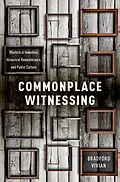Commonplace Witnessing examines how citizens, politicians, and civic institutions have adopted idioms of witnessing in recent decades to serve a variety of social, political, and moral ends. The book encourages us to continue expanding and diversifying our normative assumptions about which historical subjects bear witness and how they do so. Commonplace Witnessing presupposes that witnessing in modern public culture is a broad and inclusive rhetorical act; that many different types of historical subjects now think and speak of themselves as witnesses; and that the rhetoric of witnessing can be mundane, formulaic, or popular instead of rare and refined. This study builds upon previous literary, philosophical, psychoanalytic, and theological studies of its subject matter in order to analyze witnessing, instead, as a commonplace form of communication and as a prevalent mode of influence regarding the putative realities and lessons of historical injustice or tragedy. It thus weighs both the uses and disadvantages of witnessing as an ordinary feature of modern public life.
Autorentext
Bradford Vivian is Associate Professor of Communication Arts and Sciences at Pennsylvania State University. His previous books include Public Forgetting: The Rhetoric and Politics of Beginning Again (Penn State University Press, 2010), and his past honors include a Faculty Fellowship with the Center for Humanities and Information and a National Endowment for the Humanities Stipend.
Inhalt
Acknowledgements Introduction Chapter 1: Invention: Booker T. Washington's Cotton States Exposition Address Chapter 2: Authenticity: Binjamin Wilkomirski's Fragments Chapter 3: Regret: George W. Bush's Gorée Island Address Chapter 4: Habituation: The National September 11 Memorial Chapter 5: Impossibility Conclusion Bibliography
